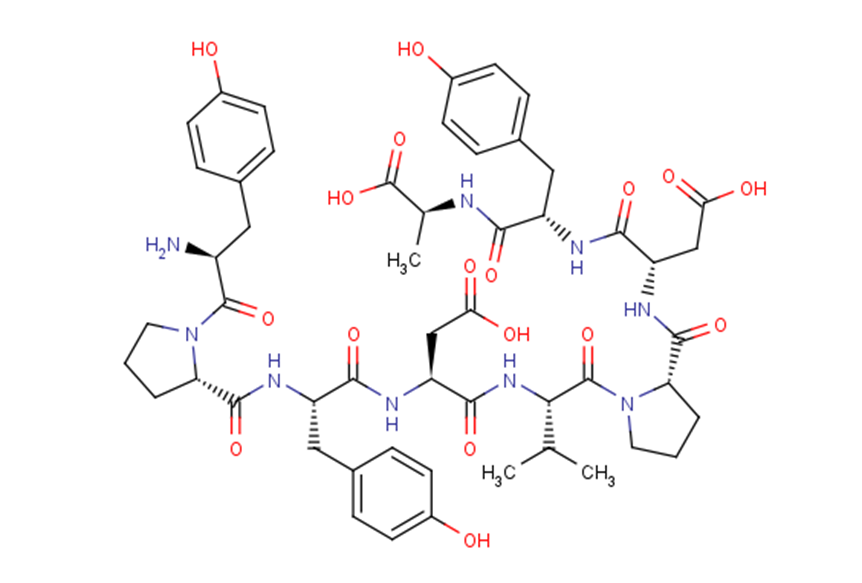
HA Peptide
CAS No. 92000-76-5
HA Peptide( —— )
Catalog No. M22312 CAS No. 92000-76-5
Influenza Hemagglutinin (HA) Peptide is a tag peptide derived from an epitope of the influenza hemagglutinin protein.HA Peptide is a highly immunoreactive tag generally used for the separation of tagged proteins from cell culture supernatants and cell lysate under neutral pH conditions and thus are handy tools for coimmunoprecipitation but are also easily detected via western blot.
Purity : >98% (HPLC)
 COA
COA
 Datasheet
Datasheet
 HNMR
HNMR
 HPLC
HPLC
 MSDS
MSDS
 Handing Instructions
Handing Instructions
| Size | Price / USD | Stock | Quantity |
| 2MG | 51 | In Stock |


|
| 5MG | 69 | In Stock |


|
| 10MG | 123 | In Stock |


|
| 25MG | 205 | In Stock |


|
| 50MG | 309 | In Stock |


|
| 100MG | 447 | In Stock |


|
| 200MG | Get Quote | In Stock |


|
| 500MG | Get Quote | In Stock |


|
| 1G | Get Quote | In Stock |


|
Biological Information
-
Product NameHA Peptide
-
NoteResearch use only, not for human use.
-
Brief DescriptionInfluenza Hemagglutinin (HA) Peptide is a tag peptide derived from an epitope of the influenza hemagglutinin protein.HA Peptide is a highly immunoreactive tag generally used for the separation of tagged proteins from cell culture supernatants and cell lysate under neutral pH conditions and thus are handy tools for coimmunoprecipitation but are also easily detected via western blot.
-
DescriptionInfluenza Hemagglutinin (HA) Peptide is a tag peptide derived from an epitope of the influenza hemagglutinin protein.HA Peptide is a highly immunoreactive tag generally used for the separation of tagged proteins from cell culture supernatants and cell lysate under neutral pH conditions and thus are handy tools for coimmunoprecipitation but are also easily detected via western blot. HA Peptide is small and thus unlikely to interfere with the bioactivity and function of the fusion partner proteins. HA Peptide comes from human influenza hemagglutinin (HA) corresponding to amino acids 98–106 and is a strong immunoreactive epitope making it popular to isolate, purify, detect, and track the protein of interest. The recombinant HA-tagged proteins can be separated by highly specific anti-HA monoclonal antibody that is covalently immobilized on resin. The HA-tagged proteins can be eluted by mild elution approach with HA epitope at 1?mg/mL in TBS. On the other hand, three chemical elution options are available: 0.1?M glycine (pH 2-2.8), 3?M NaSCN, or 50?mM NaOH. The nucleotide sequences encoding an N-terminal HA Peptide in the mammalian expression vectors is an essential element for the T7 promoter-driven expression in E. coli even without trans-acting T7 RNAP. Research results suggest that HA Peptide is cleaved by caspase 3/7, and HA Peptide cleavage results in a total loss of immunoreactivity. Observations indicate that the use of HA to tag proteins and constructs to study cell death–related and apoptotic mechanisms can result in serious artifacts.
-
In VitroHA Peptide is a highly immunoreactive tag generally used for the separation of tagged proteins from cell culture supernatants and cell lysate under neutral pH conditions and thus are handy tools for coimmunoprecipitation but are also easily detected via western blot. HA Peptide is small and thus unlikely to interfere with the bioactivity and function of the fusion partner proteins. HA Peptide comes from human influenza hemagglutinin (HA) corresponding to amino acids 98–106 and is a strong immunoreactive epitope making it popular to isolate, purify, detect, and track the protein of interest. The recombinant HA-tagged proteins can be separated by highly specific anti-HA monoclonal antibody that is covalently immobilized on resin. The HA-tagged proteins can be eluted by mild elution approach with HA epitope at 1?mg/mL in TBS. On the other hand, three chemical elution options are available: 0.1?M glycine (pH 2-2.8), 3?M NaSCN, or 50?mM NaOH. The nucleotide sequences encoding an N-terminal HA Peptide in the mammalian expression vectors is an essential element for the T7 promoter-driven expression in E. coli even without trans-acting T7 RNAP. Research results suggest that HA Peptide is cleaved by caspase 3/7, and HA Peptide cleavage results in a total loss of immunoreactivity. Observations indicate that the use of HA to tag proteins and constructs to study cell death–related and apoptotic mechanisms can result in serious artifacts.
-
In Vivo——
-
Synonyms——
-
PathwayOthers
-
TargetOther Targets
-
RecptorOthers
-
Research Area——
-
Indication——
Chemical Information
-
CAS Number92000-76-5
-
Formula Weight1102.15
-
Molecular FormulaC53H67N9O17
-
Purity>98% (HPLC)
-
SolubilityH2O:50 mg/mL (45.37 mM; Need ultrasonic)
-
SMILESCC(C)[C@H](NC(=O)[C@H](CC(O)=O)NC(=O)[C@H](Cc1ccc(O)cc1)NC(=O)[C@@H]1CCCN1C(=O)[C@@H](N)Cc1ccc(O)cc1)C(=O)N1CCC[C@H]1C(=O)N[C@@H](CC(O)=O)C(=O)N[C@@H](Cc1ccc(O)cc1)C(=O)N[C@@H](C)C(O)=O
-
Chemical Name——
Shipping & Storage Information
-
Storage(-20℃)
-
ShippingWith Ice Pack
-
Stability≥ 2 years
Reference
1.Zhao X, et al. Several affinity tags commonly used in chromatographic purification. J Anal Methods Chem. 2013;2013:581093.
molnova catalog



related products
-
I-BET567
I-BET567, a potent pan-BET inhibitor with oral activity, demonstrates pIC50 values of 6.9 and 7.2 for BRD4 BD1 and BD2, respectively. This compound has exhibited efficacy in mouse models of oncology and inflammation .
-
AC 7739
AC 7739 is a microtubule protein binding agent with anticancer and antitumor activity that inhibits advanced solid tumors and in situ transplanted tumors.
-
2-Pyrimidinamine, 4-...
2-Pyrimidinamine, 4-(5-bromo-1H-indol-3-yl)- is a marine derived natural products found in Aplidium meridianum.



 Cart
Cart
 sales@molnova.com
sales@molnova.com


